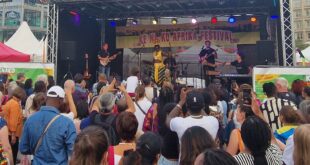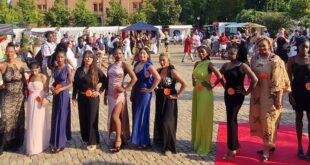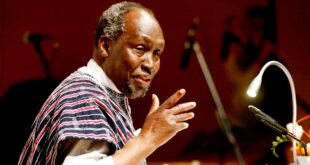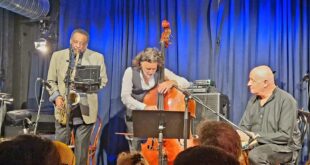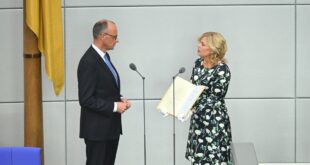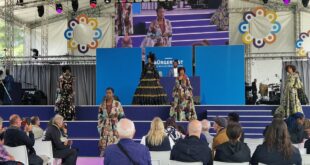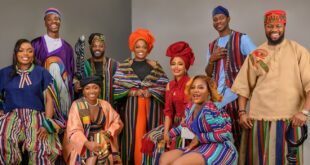Our contributing editor Alexander Macbeth writes on how the Ghanaian novelist focuses on the experience of women from their perspective, exposing how male authors have long neglected the true desires and challenges of the continent’s women. Amma Darko’s tales of wise grandmothers, resilient daughters and strong-willed victims, often caught in difficult circumstances, have made her a favourite on both sides of the Sahara.
Amma Darko (64), who lived in Germany from 1981 to 1987, encountering the hard climate and trials of a young immigrant worker and many of her first impressions and understandings of immigrant vis-à-vis host community formed the basis of her later work.
Beyond The Horizon, Darko’s first novel originally published in German as Der Verkaufte Traum, narrates the story of a naïve, uneducated African girl who is sold the dream of Europe by her distant, money-driven husband, only to be then brutally sold into prostitution by the same man.
The novel deals with the issues of prostitution and exploitation in the African Diaspora in Germany, and Ms Darko, who has been described as a writer between Africa and Europe, establishes herself as an African voice in the German language, ever expanding the horizons of African literature.
Many have hinted the story may be autobiographical, but Darko has stayed clear of fuelling such suggestions. What is certainly central to many of Darko’s novels however is a preoccupation with the positions of women in society: a disparity between the different powers of gender in marital and social situations.
Faceless, written and published in English, is at once a detective-thriller, anthropological document and political statement. It is the story of a young girl trapped in the visceral and violent underworld of ‘Sodom & Gomorra’, a nickname given to the tough district of Fadoma in the Ghanaian capital, Accra. After a coincidental meeting with a middle-class member of MUTE, a female NGO fighting for the rights of women and street-children, the street-child protagonist, Fofo, leads MUTE and the reader into a web of child prostitution and to seedy gangsters like ‘Poison’, in an environment where children are at the mercy of the streets.
Darko’s research for the novel led a German TV crew to make a documentary about the project, Roaming Around, which bought some much-needed coverage to the forgotten children of Fadoma’s streets.
Darko’s stories thus posit unity amongst women, while acknowledging the different challenges that different women face as individuals. It is against the muting of women in social, literary and political arenas that Darko continues to rise up.
Her novel Not Without Flowers returns to the process of historical Christian colonization in Ghana and the power that the new religion gave to its converts, in terms of social status and finance, vis-à-vis the ‘powers’ of indigenous religions.
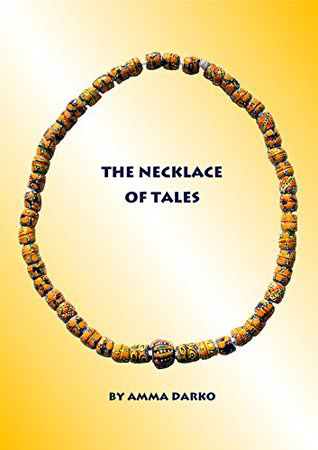
Seen from the perspective of two wives in a polygamous marriage, the novel charts the gradual conversion of a local man to Christianity, tempted by the envelopes of money from a White missionary. The novel at once deals with history, the polemic of polygamy from a female perspective, and how fiction and truth are accorded to different religious codes.
“Books always propagate knowledge,” adds Darko, as we turn to the subject of women in literature. “The issue is: do African women read what we write? If I write and nobody reads, how can they get anything out of what I write to change their life for the better?”
The idea of separate markets for male and female readers seems a strange proposition, but Ms Darko suggests a female readership is only growing recently, as women locate positive role models in novels written by women.
Several factors have kept women back from writing or reading. Ms Darko has accused certain male writers of shaping a false perception of African women. “The way that some men depict us in books is always happy. Just have children and smile… this kind of mother-earth kind of African woman.”
Indignation begins to grow in Darko’s eyes. “No, we have our pains. No, we have our problems. No, we want to talk about certain things. Now it’s like, okay, we came in late, but we’ve got so much to say. We’ve got so much to talk about, and we’re doing it fast.”
Ms Darko talks of the transition in perceptions regarding women storytellers in Ghana today. Traditionally, grandmothers would tell stories to children, while in certain West African traditions, with exceptions such as the Jeliw in Mali, oral story-telling roles and structures were often male-dominated.
Ms Darko says all that is changing, as African women vie for a new identity between tradition and modernity. More women are writing, more women are reading, and female heroines are being reshaped in African literature.
“It feels good to be able to tell your own story, like – I’m in pain because I have a rival in my marriage-. Instead of this male-like – Oh, it’s tradition and the women, you see, they live like sisters -. We don’t live like sisters; we are two in a marriage. It [the old male-dominant storytelling) made the male writers feel comfortable. So, they wrote polygamous stories, for example, in which the wives get on wonderfully, they don’t fight, they don’t argue, they don’t express their pain. Everything simply perfect. Well it is never perfect! You are sharing one husband. How can you pretend everything is perfect? Now we are writing about it and saying, “No!”.
Such a stance has often placed her in conflict with other African writers and academics, leading Darko to avoid labelling herself a feminist. “Some men turned round and said – Who said you could speak for African women? – That’s why I’m reluctant to say I write representing women”.
However, the truth is that Darko has come to fill a semi-permanent void in Ghanaian literature, assuming the mantle of literature of female distinction from Efua Sutherland in the early 90’s, with hardly any challenge or support. Ms Darko has put a woman’s face back on the literary map of Ghana.
Ghana has produced successful authors in the past such as Ayi Kwei Armah, author of The Beautiful Ones Are Not Yet Born, but Darko’s tales of wise grandmothers, resilient daughters and strong willed victims, often caught in difficult circumstances, have made her a favourite on both sides of the Sahara.
So, what challenges does Ms Darko see facing African women in the 21st century? “I would use myself as an example. Balancing the traditional expectations with my desires,” begins the author’s answer. “As of now I am not sure if any African woman can stand up today and say I don’t want to have children, for instance. I don’t think we have reached that yet. It’s one thing to be something else, and yet not being fully ready to divorce ourselves from our traditional roots. It’s a complex situation.”
Darko’s 8 novels deal with these ambiguities, and can be divided into two phases; Der Verkaufte Traum (1991), Spinnweben (1996) and Verirrtes Herz (2000) are all published in German, while The Housemaid (1998), Faceless (2003) and Not Without Flowers (2007), Between Two Worlds (2015) and The Necklace of Tales (2019) are published in English. Der Verkaufte Traum is also published in English as Beyond the Horizon.
With eight novels in just over twenty-five years Amma Darko continues to be a strong voice in West African fiction.
 THE AFRICAN COURIER. Reporting Africa and its Diaspora! The African Courier is an international magazine published in Germany to report on Africa and the Diaspora African experience. The first issue of the bimonthly magazine appeared on the newsstands on 15 February 1998. The African Courier is a communication forum for European-African political, economic and cultural exchanges, and a voice for Africa in Europe.
THE AFRICAN COURIER. Reporting Africa and its Diaspora! The African Courier is an international magazine published in Germany to report on Africa and the Diaspora African experience. The first issue of the bimonthly magazine appeared on the newsstands on 15 February 1998. The African Courier is a communication forum for European-African political, economic and cultural exchanges, and a voice for Africa in Europe.


